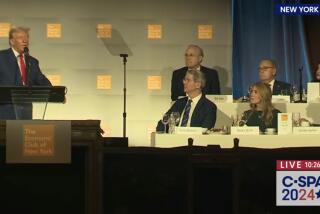Bush Unveils Proposal to Keep Pension Funds Safe
- Share via
WASHINGTON — President Bush on Friday unveiled his plan to prevent future pension fund meltdowns, prompting an immediate political and economic debate about whether the changes would be enough to keep workers from losing their life savings in future Enron Corp.-style debacles.
Bush said his pension reform plan would grant workers the same protections as a company’s executives, but Senate Majority Leader Tom Daschle (D-S.D.) immediately called the proposal inadequate--warning, as did other critics, that it could instead increase the risks that employees and shareholders face.
Daschle said Democrats soon would offer a “much tougher and more comprehensive” alternative, thus setting the stage for a high-profile, election-year fight between the Democrat-controlled Senate and the Republican White House.
Bush’s plan, which he detailed Friday at a West Virginia retreat for GOP leaders, would allow employees to sell company stock in their 401(k) accounts after three years. It also would make companies more liable for losses during so-called blackout, or lock-down, periods--like the one that kept Enron employees from selling their shares when the company’s stock plummeted last fall.
In addition, executives would be barred from selling their company shares during lockdown periods, which are typically declared when a firm changes pension plan administrators. Enron executives’ sale of company stock during its two-week lockdown has raised ire among rank-and-file workers.
“The plan will ensure that company executives be bound by the same blackout restrictions they impose on their workers,” Bush said. “If it’s OK for the sailor, it ought to be OK for the captain.”
Bush’s plan would require that companies give a 30-day notice before such lockdowns and provide more frequent reports about their 401(k) plans. Bush also wants to allow 401(k) plan providers to give workers retirement advice.
As details of Enron’s collapse emerge, the White House has become increasingly defensive about its ties to the energy company and the public perception that the administration is too cozy with big business. On Friday, Bush avoided referring to Enron by name but resorted to populist rhetoric as he promoted his pension reform plan.
“My plan will strengthen the workers’ ability to manage their own retirement funds by giving them more freedom to diversify, better access to professional investment advice and quarterly information about their investments,” he said.
About 42 million workers own 401(k) retirement accounts, with $2trillion in total assets. The plans allow workers to put aside money for retirement, tax-deferred, with employers often matching employee contributions--sometimes in company stock.
Many of the large corporations that match with stock also restrict workers’ ability to sell those shares, essentially forcing them to remain invested in the company.
A bill co-sponsored by Sen. Barbara Boxer (D-Calif.) would permit 401(k) plans to have no more than 20% of assets invested in company stock and would allow employees to sell after 90 days. A similar bill by Rep. George Miller (D-Martinez) would allow sales after one year.
“In the stock market, three years is a long time,” said Miller, who was sharply critical of Bush’s proposal. “You’re just trapping these people in the same situation that Enron trapped them in.”
Critics also panned Bush’s plan for 401(k) providers to give investment advice. They said that approach could compound the risks to workers and shareholders by allowing them to be steered into investments in which their advisors may have a financial stake.
“If there’s one lesson we should have learned from Enron, it’s that conflict of interest matters,” said Barbara Roper, head of investor protection for the Consumer Federation of America.
Though Bush’s proposals would make it easier for workers to sell company stock, some said more should be done to prevent employees from voluntarily overloading their 401(k) accounts with company shares. Many Enron employees voluntarily bought company stock for their 401(k) accounts; companywide, the plan had 62% of its assets in Enron stock, which is now virtually worthless.
But Roper and others also found elements to praise in Bush’s plan--including the fact that the chief executive’s support for change makes it more likely that Congress will enact significant reforms.
Employer groups, meanwhile, applauded Bush for not advocating limits on how much workers can invest in company shares.
But they questioned whether some of the president’s reforms could result in higher fees or fewer choices for 401(k) plans. Companies might decide against switching to a better plan because of concerns about greater liability during lockdowns, said David Wray, head of the Profit Sharing/401(k) Council of America.
Companies also might scale back or discontinue their matching contributions if employees were allowed to diversify more freely.
“Anything that would inhibit a company’s ability to provide a 401(k) match, or encourage them to forgo the match, is a big mistake,” said Mark Niziak, senior counsel at New York Life Benefit Services, a provider of 401(k) and defined-benefit pension plans.
More to Read
Inside the business of entertainment
The Wide Shot brings you news, analysis and insights on everything from streaming wars to production — and what it all means for the future.
You may occasionally receive promotional content from the Los Angeles Times.










